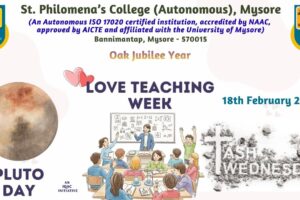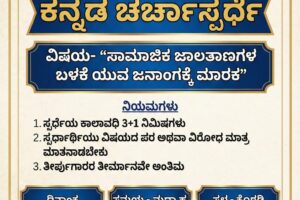
‘LET’S TALK CANCER’ – AN AWARENESS PROGRAM

ST. PHILOMENA’S COLLEGE (Autonomous), MYSORE – 570 015
Affiliated to University of Mysore
UGC Re-accredited by NAAC with B++ Grade
REPORT ON ‘LET’S TALK CANCER’ – AN AWARENESS PROGRAM
Organized by: Women Cell and Redressal of Atrocities Against Women
Venue: Auditorium, St. Philomena’s Autonomous College, Mysore
Date & Time: 7th March 2025, 2:30 PM
Speaker: Dr. Jayakarthik Y, Consultant Surgical Oncologist, Manipal Hospital, Mysore
Introduction
In recognition of International Women’s Day, the Women Cell and Redressal of Atrocities Against Women at St. Philomena’s Autonomous College took the initiative to organize a highly informative and awareness-driven session titled “Let’s Talk Cancer.” This session was exclusively conducted for the male students and staff members of the college, aiming to spread awareness about cancer, its causes, risk factors, preventive measures, and treatments.
The session was delivered by Dr. Jayakarthik Y, an eminent Consultant Surgical Oncologist from Manipal Hospital, Mysore, who holds a distinguished profile in the field of oncology. His vast experience and deep knowledge made this session highly engaging and thought-provoking.
The event was graced by prominent dignitaries, including:
- Dr. Ravi J.D. Saldanha, Principal
- Rev. Fr. David Sagayaraj, Assistant Rector
- Mr. Nagaraj Urs, Vice Principal (Academic & Administration)
- Mr. Ronald Prakash Cutinha, Vice Principal
The event was efficiently coordinated by Ms. Juhie Singh and Dr. Reena Francis, esteemed members of the Women Cell and Redressal of Atrocities Against Women. Their efforts in organizing this session were commendable, ensuring that the message of cancer awareness reached a wider audience.
Highlights of the Session
The session began with a warm welcome address by Sandesh (B.Sc.), followed by an introduction of the guest speaker by Kemuel (B.Sc.).
Dr. Jayakarthik Y, with his vast expertise and engaging communication style, presented a detailed and easy-to-understand discussion on cancer. The session was enriched with informative videos, real-life case studies, and visual aids, making the topic accessible even to those without a medical background.
Some of the key aspects covered in his talk were:
1. Understanding Cancer: What is Cancer and How Does it Develop?
Dr. Jayakarthik began by explaining that cancer is not just a single disease but a group of diseases characterized by uncontrolled cell growth. He discussed how normal cells follow a life cycle – grow, divide, and die – while cancer cells continue dividing uncontrollably and spread to other parts of the body.
2. Types and Stages of Cancer
He elaborated on the various types of cancer, classifying them based on the organs or tissues they originate from. Some of the commonly known cancers discussed were:
- Carcinomas – Affecting the skin or tissues lining organs (e.g., lung, breast, prostate cancer).
- Sarcomas – Affecting bones and soft tissues.
- Leukemias – Cancer of blood-forming tissues.
- Lymphomas – Cancer of the lymphatic system.
He also provided an insightful explanation on the staging of cancer, describing how the progression of cancer is classified into Stages 0 to IV, with Stage IV being the most advanced form.
3. Cervical and Breast Cancer – A Special Focus
Recognizing the importance of spreading awareness about cancers that primarily affect women, Dr. Jayakarthik shed light on cervical and breast cancer. He explained:
- Cervical Cancer: Caused primarily by the Human Papillomavirus (HPV), which is preventable through vaccination. Early detection through Pap smear tests can significantly reduce mortality rates.
- Breast Cancer: The most common cancer among women, he discussed self-examination techniques, the importance of mammography screenings, and the role of genetics and lifestyle factors in its occurrence.
4. Causes and Risk Factors of Cancer
Dr. Jayakarthik highlighted that cancer does not develop overnight but is the result of a combination of genetic, environmental, and lifestyle factors. Some of the major risk factors include:
- Genetic predisposition (family history of cancer).
- Unhealthy diet (excessive processed foods, red meat, sugary drinks).
- Tobacco and alcohol consumption – both of which significantly increase the risk of multiple cancers.
- Exposure to carcinogens – chemicals, pollutants, and radiation.
- Viral infections – such as HPV (Human Papillomavirus) and Hepatitis B and C, which can lead to cervical and liver cancer, respectively.
5. Prevention Strategies and Vaccination
Dr. Jayakarthik emphasized that prevention is better than cure and suggested simple yet effective ways to reduce the risk of cancer:
- Healthy lifestyle choices – Balanced diet, regular physical activity, avoiding smoking and alcohol.
- Regular screenings and check-ups – Early detection greatly improves survival chances.
- Vaccinations – Particularly against HPV (for cervical cancer) and Hepatitis B (for liver cancer).
6. Treatment Options and Advancements in Cancer Research
Dr. Jayakarthik explained the available treatment modalities, including:
- Surgery – Removal of the tumor.
- Radiation Therapy – Using high-energy rays to destroy cancer cells.
- Chemotherapy – Drugs that kill rapidly dividing cells.
- Immunotherapy – Using the body’s immune system to fight cancer.
- Targeted Therapy – Attacking specific cancer cell mechanisms.
He highlighted recent advancements in oncology, including personalized medicine and gene therapy, which have improved survival rates and reduced treatment side effects.
7. Cancer vs. Other Diseases: The Emotional and Financial Burden
One of the most thought-provoking parts of the session was the discussion on how cancer differs from other diseases. Dr. Jayakarthik emphasized that:
- Unlike infections, cancer does not have a single causative agent and can remain undiagnosed for years.
- The emotional toll on patients and families is immense, often leading to mental health issues like depression and anxiety.
- The financial burden of cancer treatment can be overwhelming, making early prevention and health insurance crucial.
Event Proceedings
The event followed a well-structured flow:
- Master of Ceremonies: Jackwin Dias (B.Sc.) efficiently conducted the session.
- Welcome Speech: Sandesh (B.Sc.) warmly welcomed the speaker and audience.
- Introduction of the Guest: Kemuel (B.Sc.) presented a detailed introduction of Dr. Jayakarthik Y.
- Vote of Thanks: Kwaja (B.Sc.) expressed gratitude to the speaker, dignitaries, and coordinators.
- Felicitation of the Speaker: As a token of appreciation, Dr. Jayakarthik Y was honored and felicitated for his invaluable contribution to raising cancer awareness.
Conclusion
The ‘Let’s Talk Cancer’ awareness session was highly informative, engaging, and impactful. Dr. Jayakarthik Y’s expertise and ability to explain complex medical topics in a simple yet meaningful manner made this session a valuable learning experience for all attendees.
The event successfully fulfilled its objective of spreading awareness about cancer, its prevention, and the importance of early detection. The Women Cell and Redressal of Atrocities Against Women deserves commendation for organizing such a significant event, fostering a culture of health awareness in the institution.
Report Prepared By:
Mary Sofia
Assistant Professor, Department of Zoology









